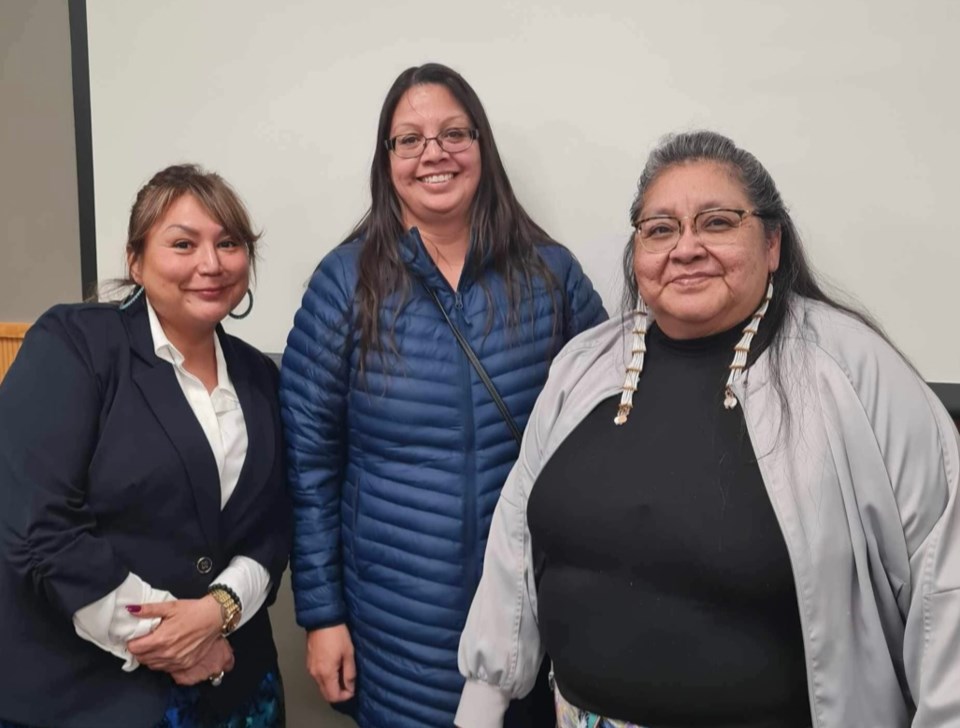Several First Nations are negotiating settlements with the federal government to resolve an unfulfilled promise in the numbered treaties to provide agricultural supports. But accepting compensation for what wasn't delivered in the past comes with a concession of the treaty right to agriculture for future generations, an Indigenous legal team warns.
"It's a settlement that has a clause that indemnifies Canada and also a clause that says that this is the final, absolute payment, or the end of any action in this area," said Rachel Snow.
"That tells us that this one-time pay is is not what our ancestors would have wanted, when they signed the treaty believing that the treaties are an eternal agreement, an eternal way of sharing with Canadian society or the people who came to form Canada."
Snow is currently on a speaking tour throughout Alberta and Saskatchewan with co-presenter Deanne Kasokeo, which she says is about sharing knowledge with grassroots community members about how these settlements will erase certain treaty rights. Kasokeo is a practising lawyer and Snow is a legal consultant and Indigenous legal knowledge keeper.
The Agricultural Benefits Agreement, better known as "Cows and Plows," promises seed, tools, livestock, and other forms of assistance for First Nations wanting to get into farming. These goods never materialized.
In recent years, First Nations have sought compensation for the provisions that went undelivered for more than a century.
K'atl'odeeche First Nation near Hay River, N.W.T., received a $28.3 million settlement in 2019. Pine Creek First Nation in Manitoba expects to receive the $205 million agreed to in its settlement delivered in the coming months.
While the dollar amounts attached to these claims are substantial, Snow said she is concerned because the language of these agreements also absolve the federal government of the ongoing responsibility to deliver on the cows and plows promise, and blocks future generations from seeking redress.
"The treaty right to agriculture — the right to get oxen, livestock, the plows and the farming implements — that would cease to exist," Snow said.
"That information has to be given to the band members so that they can make an educated decision," she said. "But they're only being told that this is a very good deal and the window is closing. If we don't take the money, we won't be able to do anything further or get any kind of an agreement in this area. Which we believe is not entirely accurate."
Snow says she and Kasokeo have received pushback from chiefs and councils on the issue, the majority of whom are in favour of accepting the settlements, even if they come with compromise.
Snow and Kasokeo have been travelling since March 2, speaking in halls and churches in towns adjacent to First Nations "but not actually on reserve, because the leadership ... knows that we're coming to dissuade our people and to give them you know, to give them the critical thinking and the warning about what this actually means: the settlement of a treaty right. We're actually going out and and trying to challenge what chiefs and councils should be doing."
Though elected officials have been cold to the info sessions, Snow said the audiences have been primarily made up of elders and youth.
"Because the elders remember what the treaty stories were and the young people are worried or concerned about how this is going to go forward."
In her role as an Indigenous legal scholar, Snow said she works with bands to "invigorate our original laws," and preserve the oral portions that accompany written treaties.
"As knowledge keepers, we have that information" and it is a detriment to the community if it is not passed on, she said.
"The treaty information that our people need to have is not necessarily part of the school curriculum. So then our kids, our grand kids, and young adults have not been taught about the importance of holding Canada to account and maintaining that treaty relationship."



